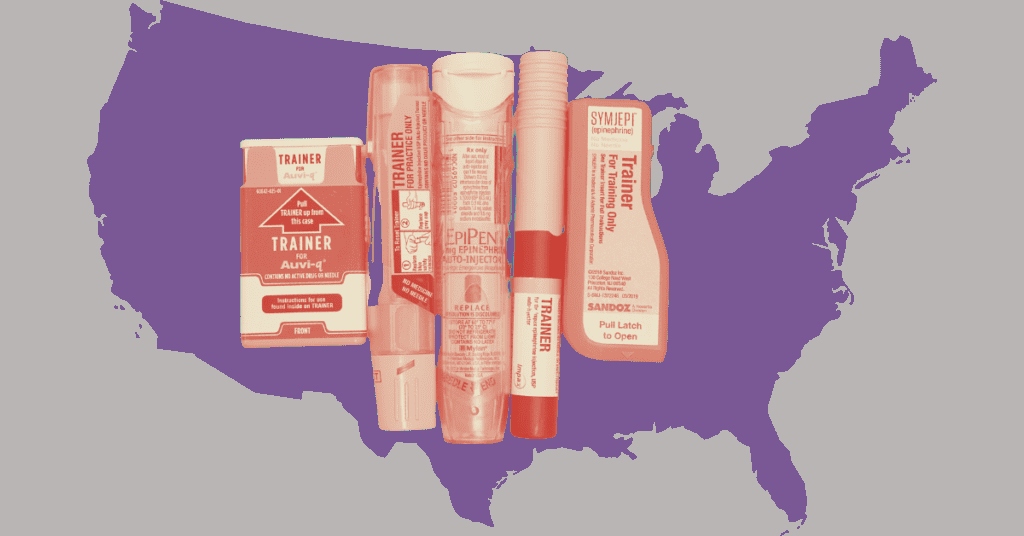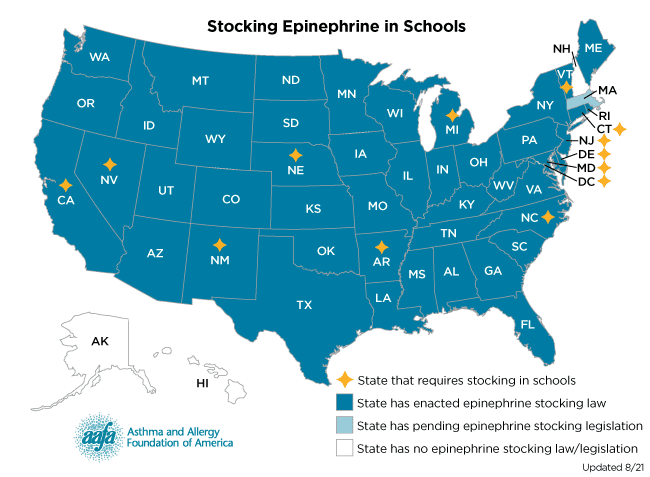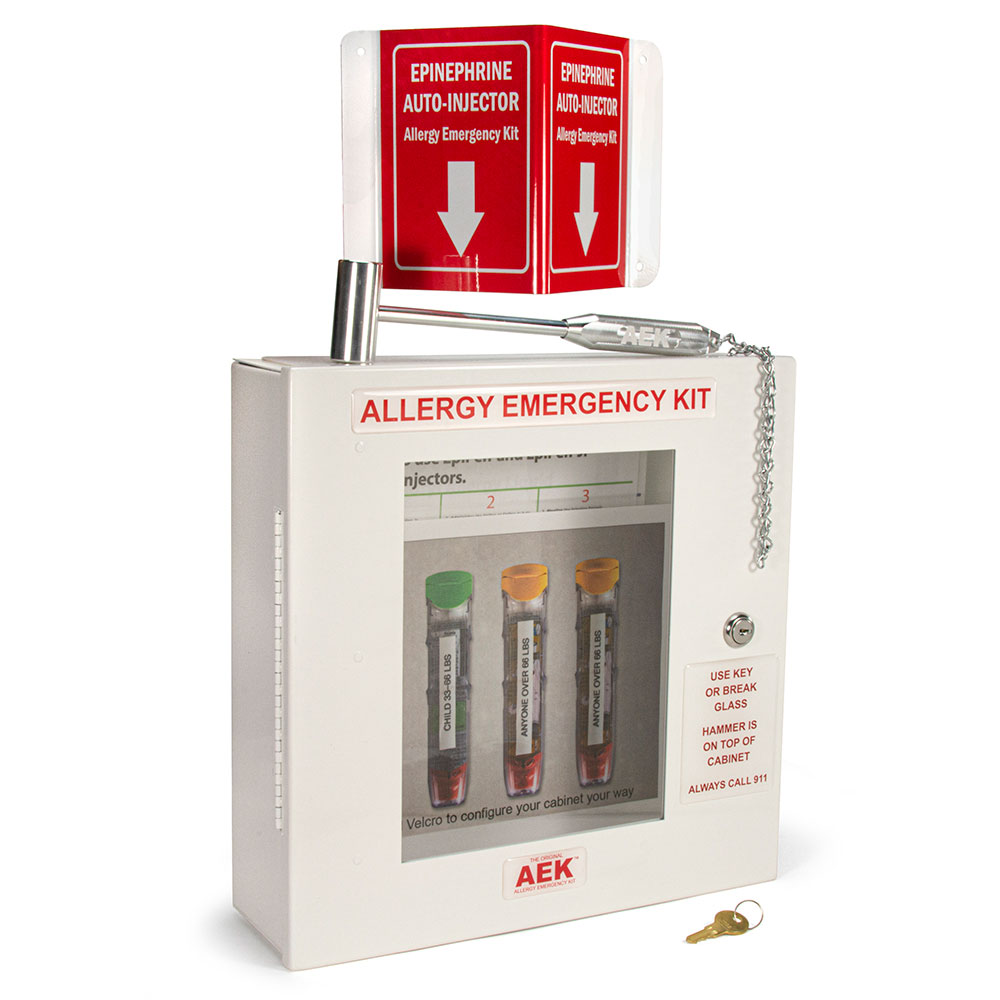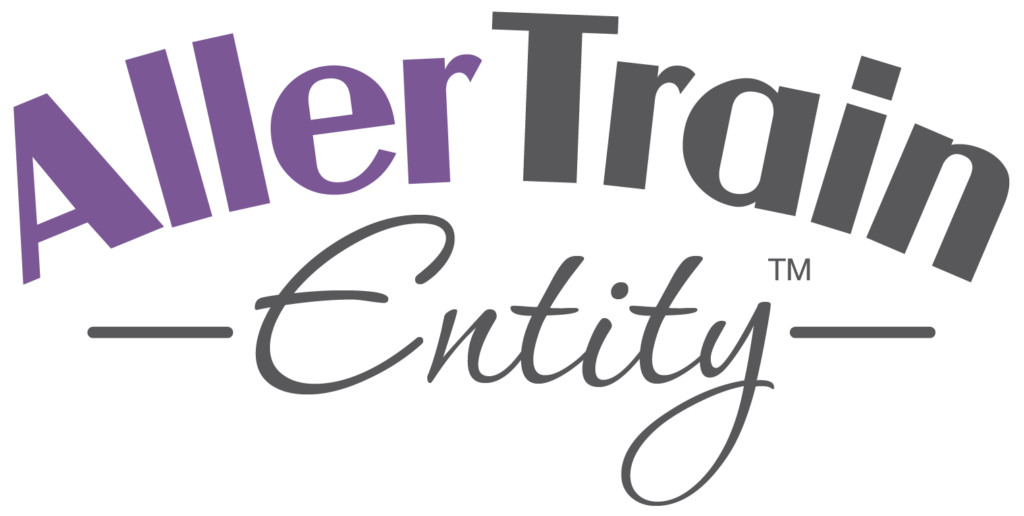
Have you learned (or taught) the Hiemlich manoever, learned CPR, learned about Narcan, or read the directions on the AED at your workplace or gym? If you have, you may be preparing to help a family member, but more likely to save the life of a stranger. These tools are for medical emergencies where help is needed immediately to save a life. Anaphylaxis from an allergic reaction is just the same.
What is Stock Epinephrine?
Stock Epinephrine (Stock Epi) is different in that it is designed to be stocked in a specific location and used for people having a severe allergic reaction who do not have their own epinephrine device with them. Why would that be necessary? First, we need to remember that 25% of the time, the first allergic reaction a person suffers is away from home. Elementary school children may react to foods not previously encountered, and may be completely unaware of what is happening to them. The stock epi legislation resulting from the tragic deaths of young children highlights the need for life-saving epinephrine to be immediately available at school.
When is Epinephrine Needed?
People with severe allergies to food, insect bites, or other allergens run the risk of life-threatening anaphylactic reactions if they are exposed to their allergen. Allergists as well as primary care practitioners can and should prescribe epinephrine self-injectors to their patients with this type of allergy. Food allergic people with epinephrine self-injectors should have 2 devices with them at all times. Adult patients, as well as family members or children with severe allergies must be alert to symptoms of allergic reaction, as well as being very familiar with the use of their epinephrine device. This device is their own prescription, from their own doctor.

Is Stock Epi Legal in All States?
- The School Access to Emergency Epinephrine Act was signed into law by President Obama in 2013, and encourages states to pass laws to require schools to have undesignated or “stock” epinephrine autoinjector devices available.
- 12 states have passed legislation mandating stock epinephrine. 35 states have “entity” laws allowing public entities such as schools, camps, and arenas to provide undesignated or “stock” epinephrine in case of emergency.
- As of January 2022, 13 states had no legislation addressing stock epinephrine. Check here https://www.foodallergyawareness.org/government-relations/stock-epinephrine-entity-laws/ for the status in your state. FAACT (Food Allergy and Anaphylaxis Connection Team) is a great contact for updated information and advocacy.
What Are the Steps to Get This On My College Campus?
Investigate current emergency processes and first responders. There may be on-campus practitioners that carry epinephrine. Make sure you verify your campus emergency number, who will answer, and what they will do.
Get to know your counterparts in student health, resident life, and safety and security. Map out the current situation and discuss gaps.
Build an alliance with other like-minded people within your organization or throughout your state. Don’t wait for a tragedy to propel your efforts.

What Are The Logistics?
- Work with your interdepartmental team to create a campus food allergy policy with an emphasis on encouraging disclosure of allergies and training for rapid emergency response and follow up.
- You need to obtain the devices, which means having someone to prescribe them. This may be the practitioner currently obtaining medications for student health services.
- Choose a location to store that is accessible during all service hours. “Locked in the manager’s desk” is not the right location. Boxes made for the purpose can be opened with a key or without if needed.
- Designate a responsible person to check expiration dates, replace devices if used, and complete required reporting.
- Learn your state’s requirements for training for staff members to allow reactions to be identified quickly, and appropriate action taken.

What About Training?
- States vary in training requirements but in general require the training to be provided by a nationally recognized organization, and to include recognition of symptoms of allergic reactions, procedures for administration of epinephrine, and emergency follow-up procedures.
- AllerTrain Entity may be taught by any AllerTrain Master Trainer, and will meet most specific state requirements. AllerTrain Entity may also be taken online. It works well as a stand-alone course or an add-on to any of the Manager level AllerTrain courses. Approximately 30 minutes long, it includes videos and interactive activities and addresses multiple auto-injector devices.
Where is This Working Well?
Numerous public schools, independent schools, and colleges and universities have stock epinephrine on hand with accompanying policies and training. Also check out bereadyhealthcare.com for an interesting story of what was done by dedicated people in a Canadian community.
Request a training device for auto-injectors
- For Auvi-Q
- Generic version of Adrenaclick
- Mylan customarily provided Epipen trainers free of charge, but has been purchased by Viatris and may be changing procedures. Epipen trainers may be purchased for a nominal fee from a number of suppliers and may be more available shortly.
What am I waiting for?
Get prepared to save a life in the hopes that you’ll never need to.
Please visit this page to find out more about MenuTrinfo’s services.

About MenuTrinfo®:
MenuTrinfo® is a company dedicated to ensuring safe food service by providing allergen and nutritional information, as well as programs such as Certified Free From™, AllerTrain® and a wide variety of services for colleges, universities, manufacturers of consumer-packaged goods, and more. We excel in employee food allergy training and certification, as well as food safety guidance and menu consulting. MenuTrinfo® has become a trusted partner for food service partners and manufacturers across the United States, and the company’s mission is to protect lives and make dining experiences as safe as possible for those with allergy restrictions.



